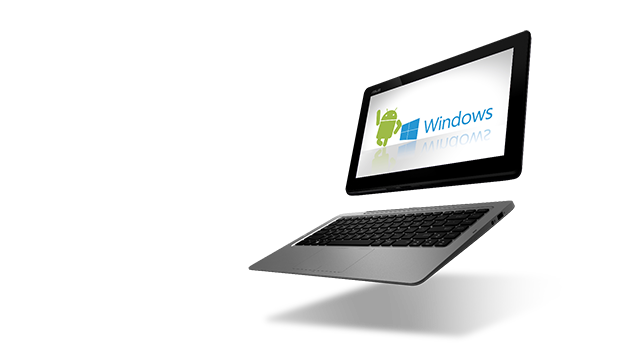
Rumours that ASUS will not release the innovative ASUS Transformer Book Duet TD300 unveiled at CES 2014 continue to gather steam. Following earlier reports, The Wall Street Journal is the latest to indicate that the dual-booting convertible tablet has been “indefinitely postponed.” Its sources indicate that Google is not alone in not wanting to see its operating system share a device with a competing system. As suspected as far back as last year when the Samsung ATIV Q, another dual-booting device, failed to launch, Microsoft appears equally opposed to such a feature.
Google and Microsoft have similar reasons for wanting to ensure that their operating systems are the only ones installed on a device. Google is looking to defend the dominant position that Android has established in the smartphone and tablet space. For its part, Microsoft is looking to defend a key market bastion: The enterprise space where it still has significant pull. Both companies have the means to help manufacturers see things their way and do not appear afraid to use them.
While Android itself is open-source (via the Android Open Source Project), many of the more desirable features it comes with are not. Google Play and services like GMail and Google Maps are part of the Google Mobile services (GMS). The latter are controlled via a separate agreement that manufacturers must adhere to in order to use. For example, it requires that Google Search be set up as the default search engine.
As for Microsoft, it can choose to withhold valuable marketing funds to companies offering dual-OS devices. It can also use its wide catalog of patents to impose its will on its partners. Lastly, a “new policy” of not supporting dual-OS products has reportedly been added to agreements with manufacturers according to a leaked ASUS internal memo.
The ASUS Transformer Book Duet TD300 will not be the only casualty of these moves by Google and Microsoft. The report adds that ASUS will also stop selling its dual-OS Asus Transformer AiO P1801 and P1802 all-in-one PCs.
Another victim of these development could be Intel. It recently announced a new chipset specifically designed to support dual-booting devices. With Windows-based devices a dwindling business, it is actively looking for new markets including the mobile space. Support for dual-booting devices could have given it a leg up over its competition.
Source : The Wall Street Journal
